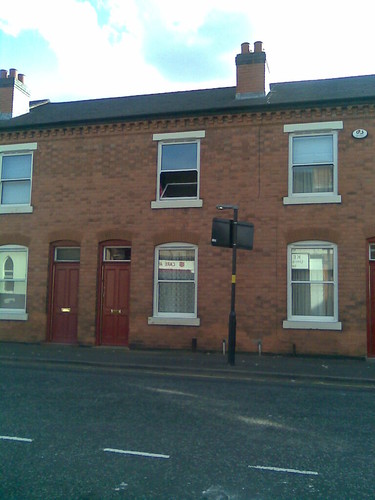Almost three years ago, I was thinking on the famous blue plaques put up by England's Historic Buildings and Monuments Commission, and lamenting that Henry Reed may never get a marker devoted to him, either in London or Birmingham, unless the buildings he once lived in could be found, and were still standing. Here are the first two paragraphs from Professor Jon Stallworthy's introduction to the Collected Poems, which provides the most insight to Reed's early life:
Henry Reed was born, in Birmingham, on 22 February 1914 and named after his father, a master brick-layer and foreman in charge of forcing at Nocks' Brickworks. Henry senior was nothing if not forceful, a serious drinker and womanizer, who as well as his legitimate children fathered an illegitimate son who died during the Second World War. In this, he may have been following ancestral precedent: family legend had it that the Reeds were descended from a bastard son of an eighteenth- or nineteenth-century Earl of Dudley. Henry senior's other enthusiasms included reading, but the literary abilities of his son Henry junior seem, paradoxically, to have been inherited from a mother who was illiterate. Born Mary Ann Ball, the eldest child of a large family that had migrated from Tipton to Birmingham, she could not be spared from her labours at home during what should have been her schooldays, and when, in her late middle age, her granddaughter tried, unsuccessfully, to teach her to read, she wept with frustration and shame. Mary Ann Reed had a remarkable memory, however, and a well-stocked repertoire of fairy-stories—told with great verve—and songs to enchant her children and grandchild.
A daughter, Gladys, born in 1908, was encouraged to make the most of the schooling her mother had not had. She was a good student and in due course became a good teacher, discovering her vocation in teaching her younger brother. Gladys played a crucial role in the education of Henry (or Hal, as he was known in the family, a name perhaps borrowed from Shakespeare's hero) and was to become and remain the most important woman in his life. He was not an easy child. On one occasion dismembering his teddy bear, he buried its head, limbs, and torso around the garden and went howling to his mother. She was obliged to exhume the scattered parts, wash, and reassemble them for the little tyrant. At the state primary school in Erdington, he clashed with a hated teacher who pronounced him educationally subnormal. A psychiatrist was called in and, having examined the child, claimed to have detected promise of mathematical genius.
A daughter, Gladys, born in 1908, was encouraged to make the most of the schooling her mother had not had. She was a good student and in due course became a good teacher, discovering her vocation in teaching her younger brother. Gladys played a crucial role in the education of Henry (or Hal, as he was known in the family, a name perhaps borrowed from Shakespeare's hero) and was to become and remain the most important woman in his life. He was not an easy child. On one occasion dismembering his teddy bear, he buried its head, limbs, and torso around the garden and went howling to his mother. She was obliged to exhume the scattered parts, wash, and reassemble them for the little tyrant. At the state primary school in Erdington, he clashed with a hated teacher who pronounced him educationally subnormal. A psychiatrist was called in and, having examined the child, claimed to have detected promise of mathematical genius.
I was excited to discover, just earlier this year, Reed's old London flat, when Google Maps UK went live with Street View. Now, owing entirely to some clever sleuthing by an Erdington native, we have the location of Henry Reed's birthplace and childhood home (not to mention, his teddy bear graveyard). Back in August, I received an e-mail from Ms. Molly James, who was concerned that Reed is not better known in his hometown, but hopeful that the Birmingham Civic Society might still properly commemorate their native son with a plaque of his own.
Molly began her research in a place I shamefully never even considered: the U.K. census. There, in the rolls for 1911, we find the family of Henry senior, living in Erdington:

The census website requires the purchase of credits to view their documents, but I can tell you that the schedule lists, living in their four-room cottage: Henry Reed, 26 years old, "Setter at Brick-kiln"; his wife, Polly Reed, 35, "at Home Work"; and daughter Gladys, just two years old. The couple had been married five years, having moved from Tipton, to the west, sometime after Gladys was born.
The Reeds' son, Henry junior, would not be born for another three years—and the next census from 1921 is not yet public—but on this information alone, Molly generously went 'round and took a few snapshots of the address (click to see larger image):
Spectacular! But Molly didn't stop there. She got in touch with archivist Jim Perkins, whom you might remember as the keeper of all things related to King Edward VI Grammar School, Aston. Mr. Perkins confirmed that the 1911 address was registered as Reed's home when the budding poet entered KEGS, Aston, in 1925.
I'm grateful for the hard work and devotion of Ms. James, and proud to add this first and preeminent location to the map of Henry Reed's life (which recently hit over 10,000 views!). Thank you, Molly! We'll see that blue plaque, yet!








